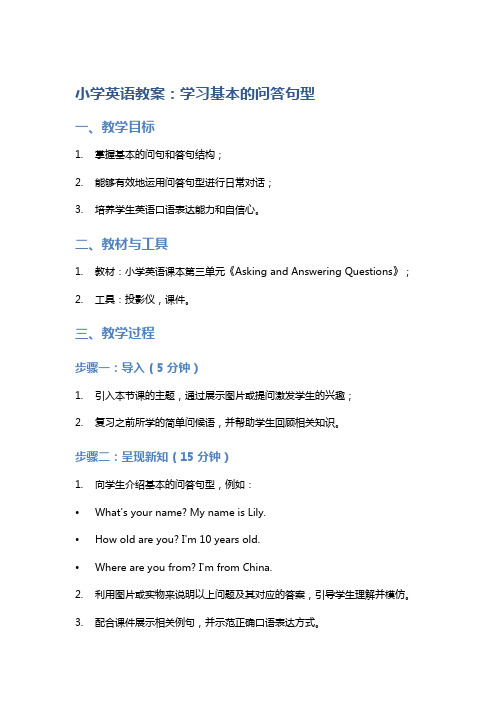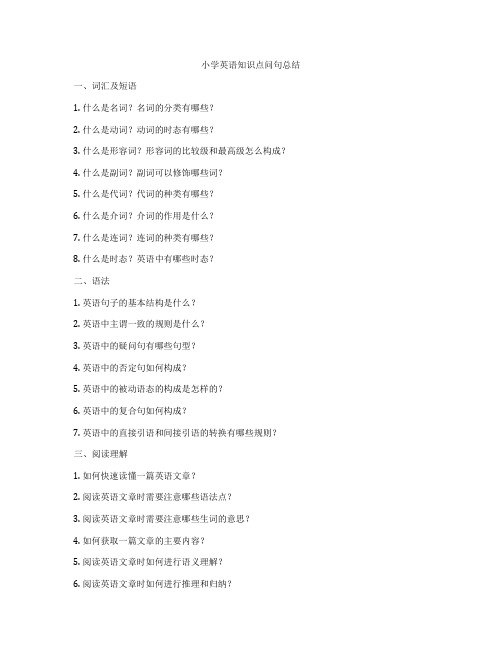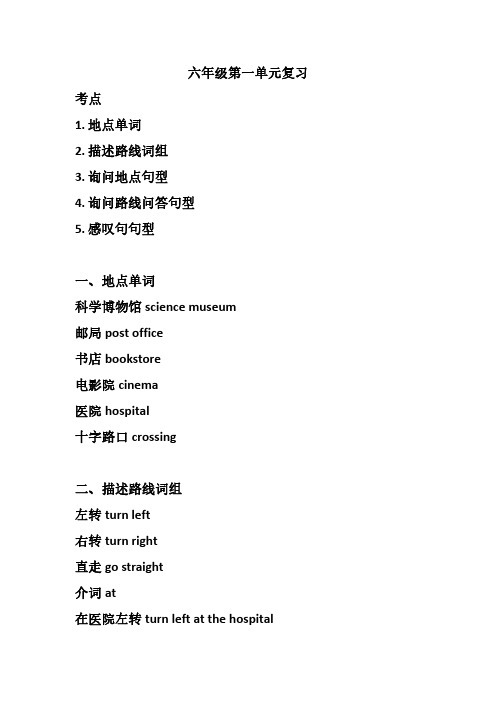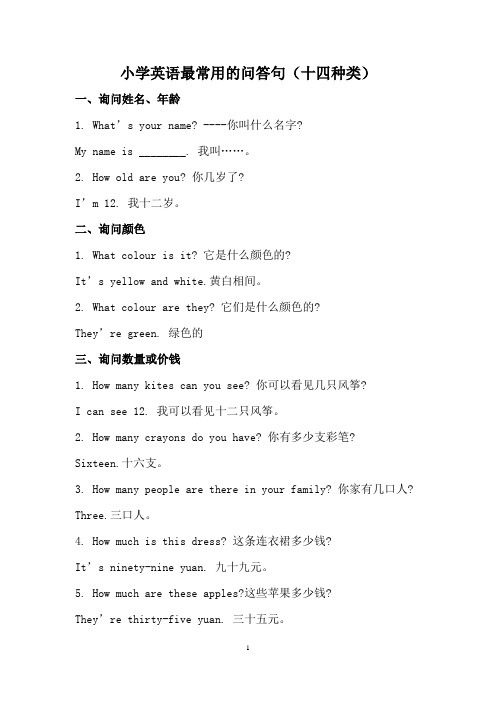小学英语问答句复习
小学英语即兴问答模板范文

小学英语即兴问答模板范文Teacher: Good morning, class! How are you today?老师:同学们早上好!你们今天好吗?Student 1: Good morning, teacher! I'm feeling great today.学生1:老师早上好!我今天感觉很棒。
Student 2: 早上好,老师!我也感觉很好。
学生2:Good morning, teacher! I feel good too.Teacher: That's wonderful to hear. Let's start our English conversation practice.老师:听到这个消息真是太好了。
让我们开始我们的英语会话练习吧。
Student 1: Sure, I'm ready!学生1:当然,我准备好了!Student 2: 我也准备好了!学生2:I'm ready too!Teacher: Great! Let's talk about our favorite activities. What do you like to do after school?老师:太好了!让我们谈谈我们喜欢的活动。
放学后你们喜欢做什么?Student 1: I love playing soccer with my friends.学生1:我喜欢和朋友一起踢足球。
Student 2: 我喜欢画画,我觉得画画很有趣。
学生2:I like drawing, I think drawing is very interesting.Teacher: Those are great activities! Playing sports and being creative are important for staying healthy and happy.老师:这些都是很棒的活动!参加体育运动和发挥创造力对于保持健康和快乐都很重要。
英语启蒙教育问答题库

英语启蒙教育问答题库1. What is the best age to start learning English?The best age to start learning English is during the early childhood years, as research has shown that children are more receptive to language learning during this time. However, it is never too late to start learning English, and individuals of all ages can benefit from language education.2. How can parents help their children learn English?Parents can help their children learn English by creating a language-rich environment at home. This can include reading English books together, watching English-language television shows and movies, and engaging in conversations in English. Additionally, enrolling children in English language classes or programs can also be beneficial.3. What are some effective methods for teaching English to young learners?Effective methods for teaching English to young learners include using interactive and engaging activities, such as games, songs, and storytelling. It is important to make the learning process fun and enjoyable for young children in order to keep them motivated and interested in learning English.4. How can teachers make English learning enjoyable for students?Teachers can make English learning enjoyable for students by incorporating a variety of activities into their lessons, such as group work, role-playing, and multimedia resources. It is also important for teachers to create a supportive and inclusive classroom environment where students feel comfortable practicing their English skills.5. What are the benefits of learning English at a young age?Learning English at a young age can provide numerous benefits, including improved cognitive development, enhanced communication skills, and increased opportunities foracademic and career advancement in the future. Additionally, learning English can also help children to appreciate and understand different cultures and perspectives.6. How can technology be used to enhance English learning?Technology can be used to enhance English learning by providing access to online resources, interactive language learning apps, and virtual language exchange platforms. Additionally, teachers can use multimedia tools, such as videos and audio recordings, to supplement their English lessons and make learning more engaging for students.7. What are some common challenges in English language learning for young learners?Some common challenges in English language learning for young learners include difficulties with pronunciation, grammar, and vocabulary acquisition. Additionally, young learners may also struggle with building confidence in using English in real-life situations.8. How can parents and teachers support young learners in overcoming language learning challenges?Parents and teachers can support young learners in overcoming language learning challenges by providing encouragement, patience, and positive reinforcement. It is important to create a supportive learning environment where children feel comfortable making mistakes and practicing their English skills without fear of judgment.9. What role does cultural immersion play in English language learning?Cultural immersion plays a significant role in English language learning by providing students with authentic opportunities to use and experience the language in real-life contexts. This can include participating in cultural exchange programs, studying abroad, or engaging with native English speakers in social settings.10. What are some practical strategies for incorporating English learning into everyday life?Practical strategies for incorporating English learning into everyday life include using English in daily routines, such as cooking, shopping, and playing games. Additionally, individuals can practice English by reading English-language materials, listening to English music, and engaging in conversations with English speakers.In conclusion, English language learning for young learners can be a rewarding and enriching experience that provides numerous cognitive, academic, and cultural benefits. By creating a supportive and engaging learning environment, parents and teachers can help children develop strong English language skills that will serve them well in the future. Incorporating a variety of interactive and practical learning strategies can make the English learning process enjoyable and effective for young learners.。
小学英语教案:学习基本的问答句型

小学英语教案:学习基本的问答句型一、教学目标1.掌握基本的问句和答句结构;2.能够有效地运用问答句型进行日常对话;3.培养学生英语口语表达能力和自信心。
二、教材与工具1.教材:小学英语课本第三单元《Asking and Answering Questions》;2.工具:投影仪,课件。
三、教学过程步骤一:导入(5分钟)1.引入本节课的主题,通过展示图片或提问激发学生的兴趣;2.复习之前所学的简单问候语,并帮助学生回顾相关知识。
步骤二:呈现新知(15分钟)1.向学生介绍基本的问答句型,例如:•What's your name? My name is Lily.•How old are you? I'm 10 years old.•Where are you from? I'm from China.2.利用图片或实物来说明以上问题及其对应的答案,引导学生理解并模仿。
3.配合课件展示相关例句,并示范正确口语表达方式。
步骤三:独立练习(20分钟)1.将学生分成小组,每个小组选择一个代表来回答老师提出的问题;2.鼓励其他学生在听到问题后积极思考,并在代表回答之后给予评价。
步骤四:合作探究(15分钟)1.学生进行两两搭档练习,模拟真实对话场景;2.通过角色扮演的方式,增强学生的口语表达能力和对话技巧。
步骤五:总结归纳(10分钟)1.引导学生总结本节课所学的问答句型的用法和特点;2.鼓励学生发表自己的想法和体会;3.将重要知识点写在黑板上供学生参考。
步骤六:拓展延伸(10分钟)1.提供更多问句和答句的例子,并引导学生进行变化尝试;2.鼓励学生运用所学内容创造新的对话情境;3.如果时间充足,可以组织小组间或全班之间进行问答游戏。
四、教学反思本节课中,通过灵活运用图片、实物等辅助教具,激发了学生的兴趣和参与度。
在练习环节中,采用小组合作、角色扮演等方式,提高了学生的口语表达能力和与他人交流的能力。
小学英语知识点问句总结

小学英语知识点问句总结
一、词汇及短语
1. 什么是名词?名词的分类有哪些?
2. 什么是动词?动词的时态有哪些?
3. 什么是形容词?形容词的比较级和最高级怎么构成?
4. 什么是副词?副词可以修饰哪些词?
5. 什么是代词?代词的种类有哪些?
6. 什么是介词?介词的作用是什么?
7. 什么是连词?连词的种类有哪些?
8. 什么是时态?英语中有哪些时态?
二、语法
1. 英语句子的基本结构是什么?
2. 英语中主谓一致的规则是什么?
3. 英语中的疑问句有哪些句型?
4. 英语中的否定句如何构成?
5. 英语中的被动语态的构成是怎样的?
6. 英语中的复合句如何构成?
7. 英语中的直接引语和间接引语的转换有哪些规则?
三、阅读理解
1. 如何快速读懂一篇英语文章?
2. 阅读英语文章时需要注意哪些语法点?
3. 阅读英语文章时需要注意哪些生词的意思?
4. 如何获取一篇文章的主要内容?
5. 阅读英语文章时如何进行语义理解?
6. 阅读英语文章时如何进行推理和归纳?
四、听力技巧
1. 如何提高英语听力水平?
2. 听力时如何抓住关键信息?
3. 听英语对话时如何理解上下文逻辑关系?
4. 听英语录音时如何注意语音语调?
5. 如何快速分辨英语中的重音单词?
以上总结了一些小学英语学习的知识点问句,希望对小学生的英语学习有所帮助。
小学英语问答句子练习题

小学英语问答句子练习题1. A: What is your name?B: My name is Emily.2. A: How old are you?B: I am eight years old.3. A: Where do you live?B: I live in Beijing.4. A: Do you have any pets?B: Yes, I have a cat.5. A: What is your favorite color?B: My favorite color is blue.6. A: What is your favorite food?B: My favorite food is pizza.7. A: When is your birthday?B: My birthday is on October 10th.8. A: What is your favorite subject in school?B: My favorite subject is English.9. A: Do you like sports?B: Yes, I like playing soccer.10. A: What do you want to be when you grow up? B: I want to be a doctor.11. A: How many siblings do you have?B: I have one brother.12. A: What is your favorite animal?B: My favorite animal is a dolphin.13. A: Can you play a musical instrument?B: Yes, I can play the piano.14. A: What is your favorite season?B: My favorite season is summer.15. A: How do you go to school every day?B: I go to school by bus.16. A: What is your favorite movie?B: My favorite movie is "Frozen".17. A: What time do you go to bed?B: I go to bed at 9 o'clock.18. A: What is your favorite hobby?B: My favorite hobby is drawing.19. A: Have you been to any other countries?B: No, I haven't been to any other countries.20. A: Can you speak any other languages?B: Yes, I can speak a little bit of French.这是一组小学英语问答句子练习题,帮助学生练习英语口语和问答对话。
小学英语六年级上册人教版第一单元复习

六年级第一单元复习考点1.地点单词2.描述路线词组3.询问地点句型4.询问路线问答句型5.感叹句句型一、地点单词科学博物馆science museum邮局post office书店bookstore电影院cinema医院hospital十字路口crossing二、描述路线词组左转turn left右转turn right直走go straight介词at在医院左转turn left at the hospital在邮局左转turn left at the post office在书店右转turn right at the bookstore在电影院右转turn right at the cinema在十字路口直走go straight at the crossing二、询问地点句型句型问:Where is+地点?答:It's+方位介词+地点.1.医院在哪?在电影院旁边。
Where is the hospital?It’s near the cinema.2.电影院在哪?紧挨着科学博物馆。
Where is the cinema?It’s next to the science museum.3.书店在哪?在邮局的前面。
Where is the bookstore?It’s in front of the post office.三、询问路线句型句型问:How can+主语+get there?How can+主语+get to+地点?答:Turn right/Turn left/go straight+at+地点.1.我们如何到达那儿?How can we get there?2.我如何到达那儿?How can I get there?3.我如何到科学博物馆?How can I get to the science museum?4.我如何到学校?How can I get to school?5.我们如何到达电影院?How can we get to the cinema?6.我们如何到达邮局?How can we get to the post office? 7.我们如何到家?How can we get home?四、感叹句句型句型结构What a/an+形容词+名词!1.多么有趣的电影啊!What an interesting film!2.多么棒的博物馆啊!What a great museum!3.多么漂亮的房间呀!What a nice room!。
小学英语最常用的问答句(十四种类)

小学英语最常用的问答句(十四种类)一、询问姓名、年龄1. What’s your name? ----你叫什么名字?My name is ________. 我叫……。
2. How old are you? 你几岁了?I’m 12. 我十二岁。
二、询问颜色1. What colour is it? 它是什么颜色的?It’s yellow and white.黄白相间。
2. What colour are they? 它们是什么颜色的?They’re green. 绿色的三、询问数量或价钱1. How many kites can you see? 你可以看见几只风筝?I can see 12. 我可以看见十二只风筝。
2. How many crayons do you have? 你有多少支彩笔?Sixteen.十六支。
3. How many people are there in your family? 你家有几口人? Three.三口人。
4. How much is this dress? 这条连衣裙多少钱?It’s ninety-nine yuan. 九十九元。
5. How much are these apples?这些苹果多少钱?They’re thirty-five yuan. 三十五元。
四、询问时间或日期1. What time is it now? 现在几点钟?It’s nine o’clock. It’s time for English class.九点。
该上英语课了。
It’s eight o’clock. It’s time to go to bed.八点。
该上床睡觉了。
2. What day is it today? 今天星期几?It’s Monday. 星期一。
3. When is your birthday? 你的生日是什么时候?It’s October 1st, our National Day. 十月一日,国庆节。
小学低年级英语问答句型句子练读

根据实际回答问题1. What’s your name? My name is ?/ I’m ?2. What is this ? It’s a plane.What is that? It’s a circle.What is it? It’s a triangle.3. Is this your pen? 用Is 问,用yes或者no来回答Yes, it’s. No,it isn’t.Is it an English book? 这是一本英语书吗?Yes, it’s. No, it isn’t.4. Are you a student? 你是一个学生吗?Yes, I’m. No, I’m not.5. Is he a boy? 他是一个男孩吗?(用he问,用he答) Yes, he is. No, he isn’t.6. Is she a girl? 她是一个女孩吗?(用she问,用she答)Yes, she is. No, shie isn’t..7.Who is he? 他是谁?He is my friend. 他是我的朋友。
Who is she? 她是谁?She is my classmate.她是我的同学。
8. Who are they? 他们是谁?(用are they问,用they are答)They are students.他们是学生。
9.Do you have any pet?你有宠物吗?(用do 问,用yes, I do 或者no, I don’t 来回答)Yes, I do. No, I don’t.10.What are these/ those/ they? 这些/那些/他们是什么?(用are问,用are 答)They are-----?11.Are these/ those/ they? Yes, they are. No, they aren’t.12.Where are you from?你来自哪里?I’m from-----(国家名). 我来自------。
- 1、下载文档前请自行甄别文档内容的完整性,平台不提供额外的编辑、内容补充、找答案等附加服务。
- 2、"仅部分预览"的文档,不可在线预览部分如存在完整性等问题,可反馈申请退款(可完整预览的文档不适用该条件!)。
- 3、如文档侵犯您的权益,请联系客服反馈,我们会尽快为您处理(人工客服工作时间:9:00-18:30)。
小学英语问答句1. How do you go to school?I usually go to school by bike.2. Where is your home? -----It’s near the library.3. What are you going to do this weekend?I’m going to visit my grandparents. I want to buy a pair of shoes.4. What are you going to buy?I’m going to buy an English book.5. When are you going? -----I’m going at 7 o’clock.6. How can I get to the museum?You can go by the No.15 bus.7. Can I go on foot?----Sure, it’s not far. / Sure, if you like.8. Is it far? /Is it far from here?-----Yes, it is. No, it’s not far.9. Who is your Chinese teacher? -----Mr Zhang.10. What’s he like? -----He is tall and thin.11. What’s she like? -----She is very friendly.12. What’s your favourite food?My favourite food is fish.13. What’s your favourite fruit?My favourite fruit is grapes.14. What do you have for lunch today?I have tomatoes and beef.15. What would you like for lunch?I’d like some mutton and potatoes.16. What day is it today? -----It’s Wednesday.17. What do you have on Mondays?We have English, Chinese and science.18. What do you do on Saturdays?I often do my homework.19. What can you do? -----I can sweep the floor.20. Are you helpful at home? -----Sure. / Of course.21.Can you set the table? ----Yes, I can. / No, I can’t.22.Is this your bedroom? ----Yes, it is. / No, it isn’t.23. Where is the air-conditioner? -----It’s on the wall.24. Is there a river in the park?-----Yes, there is. / No, there isn’t.25. Are there any fish in the rivers?-----Yes, there are. / No, there aren’t.26. When do you get up? -----At 7 o’clock.27. W hat’s your favourite season?My favourite season is summer.28. Which season do you like best? -----I like summer best.29. Why do you like summer? -----Because I can swim.30. When is your birthday?My birthday is in June. / My birthday is June 8th. 31. Is your (her/his/ your father’s)b irthday in October?-----Yes, it is. / No, it isn’t.32. What’s the date? -----It’s March 12th.33. Who has a birthday in July? -----Me.34. What are you doing? -----I’m reading a book.35. What is he (your father/ brother/Zhangpeng)doing?He is cleaning the room.36. What is she(your mother/sister/Amy) doing?She is washing clothes.37. Can I speak to Sarah? -----Please hold on.38. What is it(the elephant) doing? -----It’s running.39. What are they doing? -----They are drinking water.40. What do you see? -----I see some monkeys.41. What can you see in our classroom?I can see many desks and chairs.42. Are you eating lunch?Yes, I am./ No, I’m not./ Yes, we are./ No, we aren’t.43. Are they playing football?-----Yes, they are. / No, they aren’t.44. Is he cleaning the windows?-----Yes, he is. / No, he isn’t.45. Is she writing a letter?-----Yes, she is. / No, she isn’t.46. We have a new classroom.Really? Let’s go and see. /Let’s go and have a look.47. Let’s clean the desks and chairs.All right. / Ok. / Good idea.48. How many books do you have? -----I have 12.49. How many rulers do you see? -----I see 12.50. May I have a look? -----Sure, here you are.51. What colour is it? / What colour is the bag?-----It’s blue.52. What’s in your schoolbag?An English book and a pencil box.53. What’s his name? -----His name is Mike.54. What’s her name? -----Her name is Bai Ling.55. Who is he? -----He is Mike. / His name is Mike.56. Who is she? -----She is Amy. / Her name is Amy.57. Is he Zhangpeng?-----Yes, he is. / Yes, you are right. / No, he isn’t.58. Is she Sarah?-----Yes, she is. / Yes, you are right. / No, she isn’t 59. Is this(that) your eraser?----Yes, it is. / No, it isn’t.60. Are they on the table?-----Yes, they are. / No, they aren’t.61. Can I have some noodles? -----Sure. Here you are.62. Can I help you? -----Yes, please. / No, thanks.63. What’s your father(brother)? -----He is a doctor.64. What’s your mother(sister)? -----She is a farmer.65.Do you have a storybook? ----Yes, I do. / No, I don’t.66. What time is it? -----It’s 6:30.67. What’s this? -----It’s a T-shirt.68. What are they(these/ those)? -----These are shoes.69. Whose is it? -----It’s my shirt.70. Wh at’s the weather like today?-----It’s sunny. / It’s warm.71. How much is it(the skirt)? -----It’s 20yuan.72. How much are they(the socks)? -----They are 40yuan.73. Are these(those) tomatoes?----Yes, they are. / No, they aren’t.74. Where are you from? -----I’m from China.75. -----Good morning. ----- Good morning.76. -----Good afternoon. ----- Good afternoon.77. How are you?I’m fine. Thank you./ Fine, thanks./ Very well, thanks.78. How old are you? -----I’m 12 years old.79. Nice to meet you. / Nice to see you.---- Nice to meet you, too. / Nice to see you, too.80. This is my friend, Amy. -----Nice to meet you.81. Do you like apples?Yes, I do. / No, I don’t./ Sorry, I don’t like apples.82. -----Have some apples. -----Thank you.83. -----Look at the bear. -----It’s fat.。
